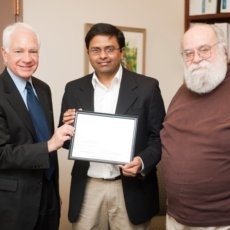The MIT Sea Grant College Program has announced that nominations are now open for the Doherty Professorship in Ocean Utilization. All non-tenured MIT faculty members from any Institute department are eligible. Department heads may submit one nomination every year. The deadline for nominations is Nov. 16. The person appointed to the chair will receive $25,000 per year for two years, beginning July 1, 2012.
Endowed by the Henry L. and Grace Doherty Charitable Foundation, the two-year chair opens the way for promising, non-tenured professors to undertake marine-related research that will further innovative uses of the ocean's resources. There are no restrictions on the area of research, and any aspect of marine use and/or management may be addressed, whether social, political, environmental, economic or technical.
Final selection will be made by a committee that includes the vice president and dean for research, the dean of engineering, the dean of science, the chairman of the Sea Grant Committee and the director of the MIT Sea Grant College Program, following review and recommendations from the Sea Grant Faculty Committee. The vice president for research will appoint the new Doherty Professor in January 2012. While serving as the Doherty Assistant or Associate Professor of Ocean Utilization, the incumbent cannot hold another MIT-funded chair.
In 2011, the award went to Kripa Varanasi, Assistant Professor in the Department of Mechanical Engineering, for his work titled, "Nanoengineered Surfaces for Hydrate Mitigation in Subsea Oil and Gas Operations." Varanasi will conduct fundamental research on emulsions under subsea conditions. Currently, very little is known — for example, the physicochemical and environmental effects of the demulsifiers used to break down oil in the Macondo oil well blowout are unknown.
Anyone wishing to be nominated should contact his or her department head. For nomination procedures and selection criteria, consult the website, or contact Kathy de Zengotita, Room E38-330, 617-253-7042, kdez@mit.edu.
Endowed by the Henry L. and Grace Doherty Charitable Foundation, the two-year chair opens the way for promising, non-tenured professors to undertake marine-related research that will further innovative uses of the ocean's resources. There are no restrictions on the area of research, and any aspect of marine use and/or management may be addressed, whether social, political, environmental, economic or technical.
Final selection will be made by a committee that includes the vice president and dean for research, the dean of engineering, the dean of science, the chairman of the Sea Grant Committee and the director of the MIT Sea Grant College Program, following review and recommendations from the Sea Grant Faculty Committee. The vice president for research will appoint the new Doherty Professor in January 2012. While serving as the Doherty Assistant or Associate Professor of Ocean Utilization, the incumbent cannot hold another MIT-funded chair.
In 2011, the award went to Kripa Varanasi, Assistant Professor in the Department of Mechanical Engineering, for his work titled, "Nanoengineered Surfaces for Hydrate Mitigation in Subsea Oil and Gas Operations." Varanasi will conduct fundamental research on emulsions under subsea conditions. Currently, very little is known — for example, the physicochemical and environmental effects of the demulsifiers used to break down oil in the Macondo oil well blowout are unknown.
Anyone wishing to be nominated should contact his or her department head. For nomination procedures and selection criteria, consult the website, or contact Kathy de Zengotita, Room E38-330, 617-253-7042, kdez@mit.edu.






